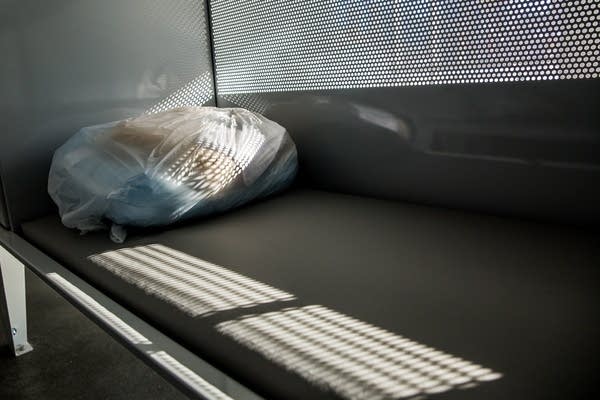MN homeless shelters struggle to provide safety, distance to prevent COVID-19

Go Deeper.
Create an account or log in to save stories.
Like this?
Thanks for liking this story! We have added it to a list of your favorite stories.
Advocates for the homeless in Minnesota, bracing for surging needs, are pleading for more state resources to help protect the vulnerable population in crowded shelters and emergency centers.
Leaders of nonprofits that serve the homeless say they're on the front lines of the coronavirus crisis. But they say conditions at already-busy shelters, where people often sleep and eat close together and share restrooms, make it difficult to provide a safe environment.
"We are operating field hospitals for the poor,” said Tim Marx, president and CEO of Catholic Charities of St. Paul and Minneapolis. “Social distancing, sanitary conditions and other things that keep people safe from the virus and keep them from spreading the virus simply are very difficult, if not impossible, to make happen in our shelters."
Advocates said their shelters and other services already were facing an increase in need even before the COVID-19 outbreak began.
Turn Up Your Support
MPR News helps you turn down the noise and build shared understanding. Turn up your support for this public resource and keep trusted journalism accessible to all.
According to the latest study by Wilder Research, nearly 20,000 people were estimated to be experiencing homelessness in Minnesota on any given night in 2018. Those numbers are expected to rise as many Minnesotans lose their jobs due to stay-at-home restrictions and business closings.
Many of the homeless have chronic health conditions, putting them at “grave risk” if they contract COVID-19, said Rhonda Otteson, executive director of the Minnesota Coalition for the Homeless. She also said there’s been an increase in the number of people living without shelter or doubling up with friends or family.
"In a time when we are supposed to be social distancing to protect our neighbors and so we don't overwhelm the limited capacity of the health care system, we have thousands of people in Minnesota living in spaces that were not designed for social distancing,” Otteson said.
Hennepin County already has taken steps to move medically at-risk people from homeless shelters to hotels. Beginning Friday, Ramsey County is opening Mary Hall, the former Dorothy Day Center downtown, as a respite facility for single adults displaying symptoms of COVID-19.
And in Rochester, Olmsted County and Catholic Charities of Southern Minnesota are using the Mayo Civic Center Exhibition Hall as a temporary day center and night shelter.
Still, Steve Horsfield, executive director of the nonprofit Simpson Housing Services in Minneapolis, said he remains “gravely concerned” about the risk of illness at shelters.
“Our shelter guests are sharing restrooms with 70 of their peers,” Simpson said. “Our assumption is that once we do get a case of COVID-19 in the shelter, it’s going to spread like wildfire.”
Advocates say they’ve taken steps to sanitize shelters and keep distance among residents when possible, but they need assistance to do more.
Marx, of Catholic Charities, said nonprofits serving the homeless should be eligible for some of the $200 million in relief funding that the Legislature provided earlier this month to health care providers to help with their response to COVID-19.
He also said the state should provide more funding for housing and services, and get the elderly out of shelters and into hotels.
“We need to think of strategies to get people out of encampments into safe and decent facilities,” Marx said. “We need access to arenas and other places where meals can be served in a healthy way, with appropriate social distancing.”
Advocates also say the state should increase funding for rental assistance to prevent those who have lost their jobs due to the COVID-19 pandemic from becoming homeless.


